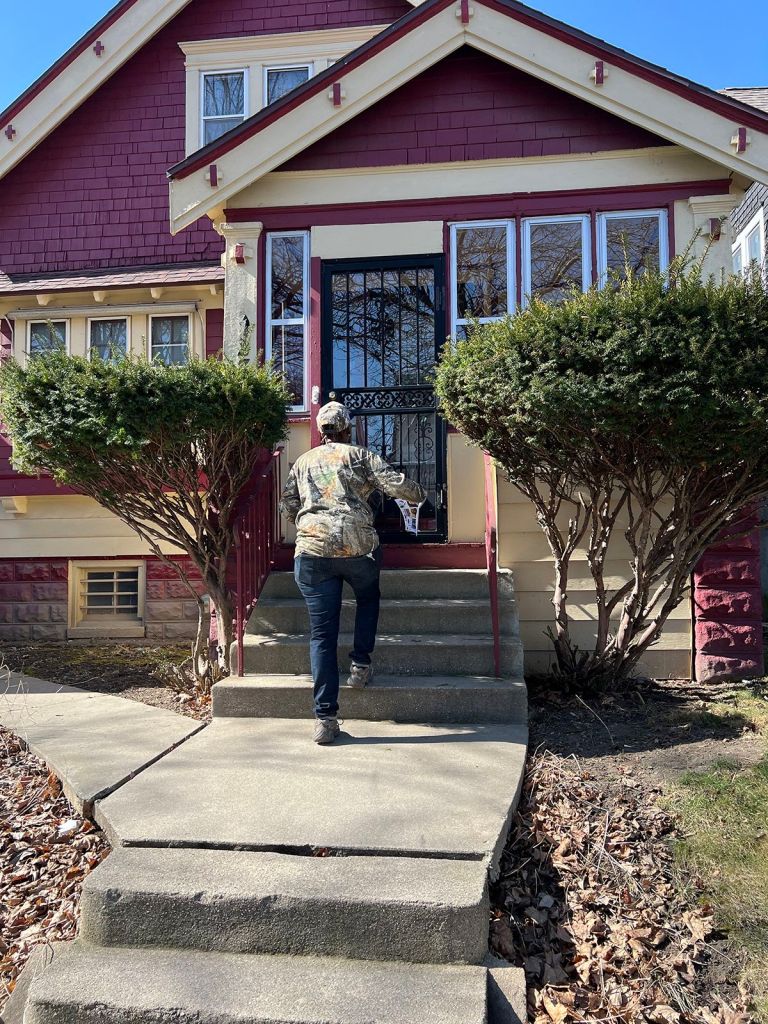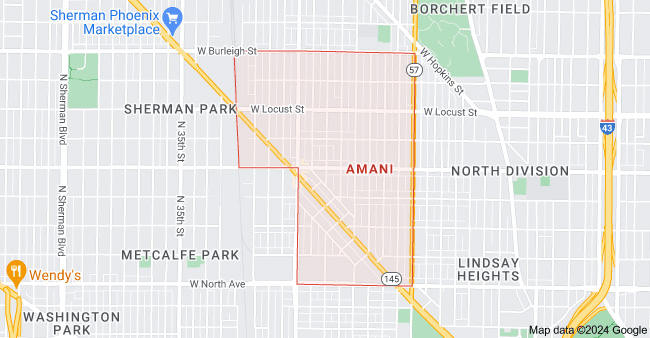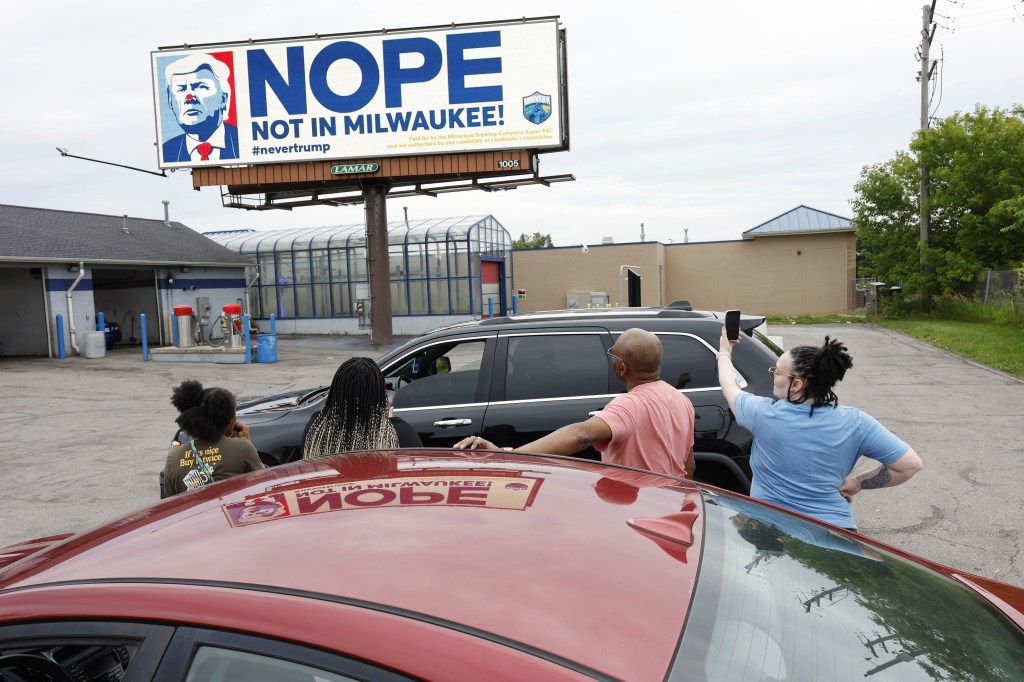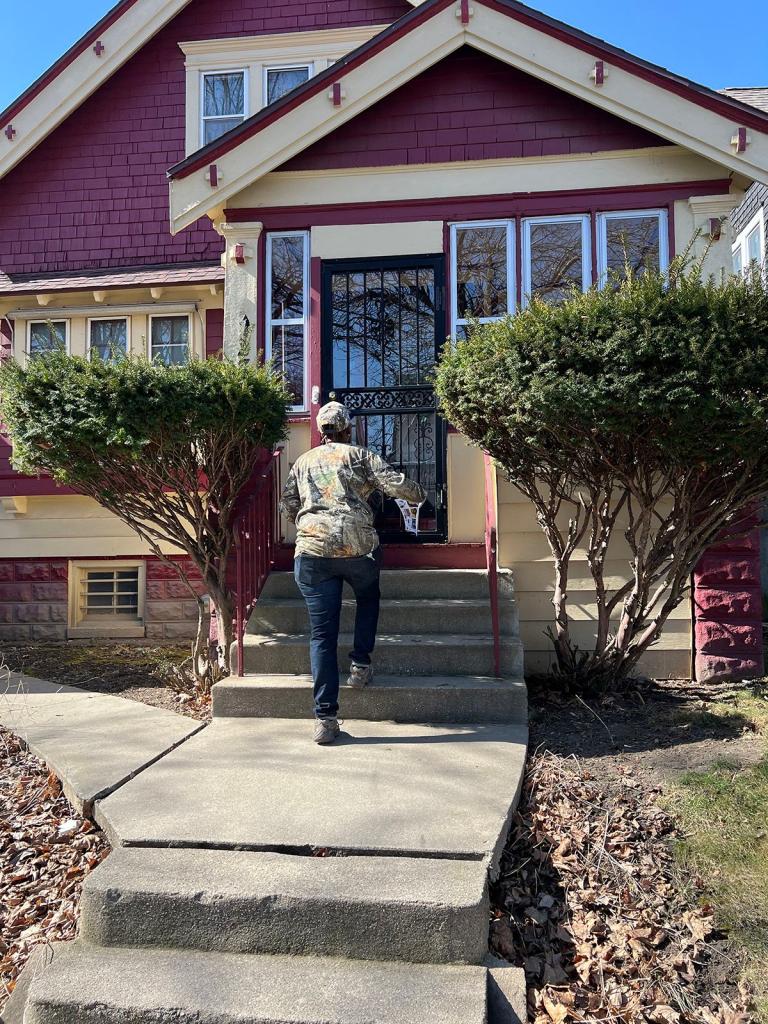The most rent-burdened city in the Midwest is in this key battleground state, posing complex challenges for Biden’s campaign
Each April, when the local energy company again starts shutting off late-paying customers after its winter moratorium, Milwaukee resident Elizabeth Brown faces a dilemma: pay her rent on time or keep the lights on.
For seven years, Brown, 50, has been living in a single-family rental in the Amani neighborhood, a historically Black area on Milwaukee’s northwest side.
Still feeling the legacy of historical redlining policies and a lack of investment from the city, more than half of the neighborhood’s residents are living below the poverty line, according to the Dominican Center, a nonprofit dedicated to neighborhood revitalization.
Brown, a mother of nine with two young children still living at home, has struggled through periods of unemployment that made it difficult to pay her $775 monthly rent. Now working a steady job as a youth organizer, she dreams of buying her own home to escape what she calls “slumlord” conditions in her rental, where the kitchen plumbing is nonfunctional and other serious issues go unfixed.
But Brown faces challenges in coming up with a down payment and passing credit checks after long-running disputes with her absentee landlord, an LLC registered in Utah that purchased the home in 2022.
“You have these landlords who will rent to you because you’re in a desperate situation, and they take advantage,” she says. “They don’t keep up with the house. … They just collect the rent and do nothing else.”
According to the latest Realtor.com® rent report, Milwaukee was the most rent-burdened city in the Midwest last month, outpacing larger cities such as Chicago and Indianapolis when it comes to the share of income the typical renter must devote to housing.
In May, the rent-to-income ratio in the Milwaukee metro area was 27.4%, up from 26.8% a year earlier. It’s also well above the national major-metro average of 24.7%.
The median rent in Milwaukee stood at $1,690 last month, up 4.3% from a year ago and rising faster than local wages. Local experts call the city’s rental affordability situation dire, raising the possibility that the issue will play an important role in the upcoming presidential election.
Keep up with today's most important news
Stay up on the very latest with Evening Update.
Thanks for signing up!
Milwaukee’s key role in 2024 election
Wisconsin is one of the key swing states set to decide the November election, along with Arizona, Georgia, Michigan, Nevada, North Carolina, and Pennsylvania. Donald Trump won all but Nevada in 2016, while President Joe Biden carried all but North Carolina in 2020.
To win Wisconsin, Biden will need a strong turnout in Milwaukee, a Democratic stronghold that was crucial in narrowly flipping the state in his favor four years ago. Underscoring the city’s key role in 2024, the Republicans will hold their national convention in Milwaukee next month, where Trump will be officially crowned as the party’s nominee.
Brown says that she believes action on affordable housing in Milwaukee is most urgently needed at the city level, rather than from the federal government. But she warns that frustration over rent and the rising cost of living in the hard-hit Amani neighborhood could affect voter turnout there in November.
“You don’t know if you’re going to be able to eat, have lights, or even have a house the next day, and you want me to worry about other stuff? You want me to worry about voting? A lot of people don’t even want to vote. They feel like it don’t make a difference, no matter who’s in office,” says Brown. “People are getting fed up.”
A White House spokesperson referred Realtor.com to Biden’s recent proposals to lower housing costs across the country by funding the construction of millions of new homes, offering down payment assistance to first-generation homeowners, and cracking down on “rent gouging by corporate landlords.”
But many of those proposals face an uphill battle in Congress, where Republicans currently control the House. As well, the Biden campaign has its work cut out informing voters about Biden’s plans, which differ sharply from Trump’s comments on housing.
Trump, who first gained fame as a real estate tycoon, has blamed Biden for rising rents and mortgage rates, while simultaneously accusing the Democrat of plotting to “destroy your property values.”
Last week, in a closed-door meeting with House Republicans, Trump reportedly called Milwaukee “horrible.” The Trump campaign denied the report from NBC News, insisting that he had been “explicitly referring to the problems in Milwaukee, specifically violent crime and voter fraud.”
“The contrast in leadership couldn’t be more clear this November for Wisconsinites: Donald Trump just yesterday in Washington promised CEOs tax cuts, and is proudly running to slash affordable housing programs,” said Wisconsin Biden-Harris Press Secretary Timothy White in a statement to Realtor.com.
“Corporations and landlords shouldn’t be seeing record profits while hard-working Americans struggle to pay their bills. That’s why President Biden and Vice President [Kamala] Harris have made tackling corporate greed and lowering costs a priority, and have proposed the boldest housing plan in a generation to lower housing costs, including by boosting housing supply,” said White.
“Wisconsinites deserve a president fighting for them, not themselves. That’s President Biden,” he added.
Why is rent so unaffordable in Milwaukee?
In the city of Milwaukee, 53% of renters are spending more than a third of their income on rent, exceeding the threshold that is considered affordable, according to the Community Development Alliance.
Black and brown residents are the hardest hit. In neighborhoods that are majority Latino, 60% of families are paying unaffordable rent, and for neighborhoods that are mostly Black, the figure rises to 70%.
“The housing market is really challenging for both renters and homeowners in Milwaukee, particularly for Black and brown families,” says Teig Whaley-Smith, chief alliance executive of the CDA. “And it’s largely because local policy is artificially reducing the amount of housing units, and state policies ensuring distortion of the market so that more of those units are rental versus homeownership.”
Whaley-Smith says that, after the 2007 financial crisis triggered a tidal wave of foreclosures in low-income areas, out-of-state investors swooped in, bought properties, and raised rents.
“A home that you could purchase for a mortgage of about $700 a month just seven years ago, now you’re only able to rent that home for $1,400 a month, and that money is being exported out of our economy,” he says.
A 2021 report from the Milwaukee Journal-Sentinel stated that the number of single-family homes for rent in the city limits had more than doubled since 2005, to 18,800.
About half were valued at $75,000 or less, and 5,000 of the rental homes were valued at $50,000 or less. At those prices, a typical 30-year mortgage would come with payments less than $550, even at interest rates above 7%. That’s far less than many renters are paying for the homes.
Brown’s rental home is a case in point. Records show a bank foreclosure on the home in 2004, followed by a series of off-market deed transfers between LLCs, ending with the Utah-based company that purchased the home in 2022. The home, which needs major renovations and repairs, was recently put on the market for $54,900 and is pending sale.
Brown, who has stopped paying rent altogether due to the home’s unlivable condition, is uncertain what will happen when the new owners close on the property.
“They buy these houses sight unseen,” she says. “I have no idea what they’re going to do. But regardless of what anybody does, I still have to move out of that house, because that house has to be gutted.”









